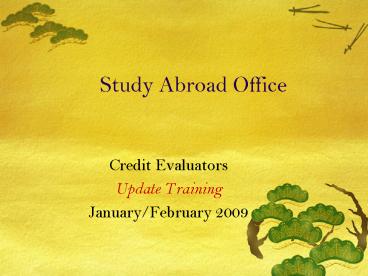Study Abroad Office - PowerPoint PPT Presentation
1 / 11
Title:
Study Abroad Office
Description:
Study Abroad Office. Credit Evaluators. Update Training ... HIS 331C History of the Ottoman Empire. Topics Course. HIS 350L Undergraduate Seminar in History; ... – PowerPoint PPT presentation
Number of Views:54
Avg rating:3.0/5.0
Title: Study Abroad Office
1
Study Abroad Office
- Credit Evaluators
- Update Training
- January/February 2009
2
Understanding the Process
Pre application Assess viability of location
based on course options/equivalents
Away Confirm equivalents to ensure correct
placement and degree progression
Pre-departure Determine equivalents to ensure a
productive semester abroad
Returned Processing credit so student can
graduate or continue in degree program
3
Making Evaluations
- Departmental Course Offering HIS 331C History
of the Ottoman Empire - Topics Course HIS 350L Undergraduate Seminar in
History Topic 25 Women in Asian Societies - Variable Hours HIS 329S History of Asian Art
- Another department ANS 372 Topic 24 Buddhist Art
4
Variable Hours
- Variable credit hours were created for the
purpose of equating courses taken at foreign
institutions to the UT course inventory in
situations when our inventory was lacking an
appropriate equivalent. - 119S, 219S, 319S, 419S, 519S, 619S, 719S, 819S,
919S. - 129S, 229S, 329S, 429S, 529S, 629S, 729S, 829S,
929S. - Topics in Anthropology. This course is used to
record credit the student earns while enrolled at
another institution in a program administered by
the University's Study Abroad Office. Credit is
recorded as assigned by the study abroad adviser
in the Department of Anthropology. University
credit is awarded for work in an exchange
program it may be counted as coursework taken in
residence. Transfer credit is awarded for work in
an affiliated studies program. May be repeated
for credit when the topics vary. - Business 140S series (no lower division series)
- Communication only COM 119S 129S
- Fine Arts 119Q 129Q series
- Natural Sciences 119S 129S series
- Architecture, Education, Engineering not
applicable
5
Best Practice
- Evaluate the course, not the student in the
course. - We have a commitment to ensure that each course
evaluation can stand alone in its assessment. - Individual student situations should be rare
exceptions, not standard practice.
6
Specifics of Evaluation
- Determing Upper vs Lower Division
- Determing the number of hours to be awarded
7
Credit Database
- The Study Abroad Office maintains a database of
all evaluations (exchange and affiliated). - Evaluations are
- good for 5 years
- strictly monitored for accuracy
- used as a planning tool for students
- shared with evaluators and departments annually
(will be on the web in 2009)
8
Responsibilities
- Student It is the students responsibility to
determine the courses s/he needs to take abroad
and to locate the supporting educational
materials (syllabus, reading list, etc) and to
follow the processes stipulated to acquire
equivalencies for each course. - Staff It is the study abroad professionals
responsibility to assist the student in
understanding the foreign educational environment
and the process to obtain equivalencies. - Academic Advisor It is the advisors
responsibility to assist the student in
understanding what remains for completion of his
or her degree. - Evaluator It is the evaluators responsibility to
evaluate courses in timely manner and to make
evaluations with a perspective and understanding
of international education.
9
Database Example
10
Equivalency Form
For question contact sending individual
Note (example) Not enough information to make
evaluation
To consult with a colleague view full list of
evaluators online
11
Contacts
- Lia Haisley
- Sr. Program Coordinator
- liah_at_austin.utexas.edu
- 471-1158
- Why call? Questions about partners, education
systems or working with Study Abroad Advisors
Heather Thompson Assistant Director heatherm_at_austi
n.utexas.edu 471-1127 Why call? Need additional
training for colleagues or academic advisors and
faculty































